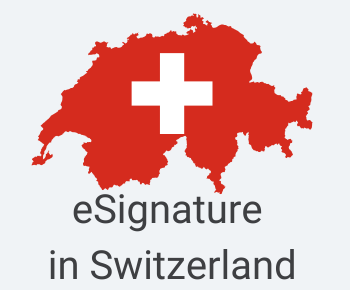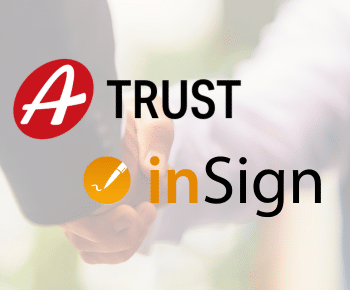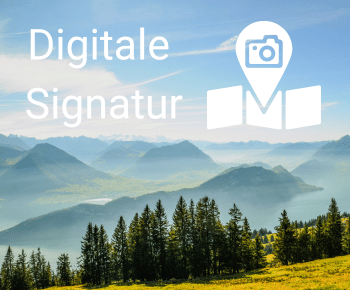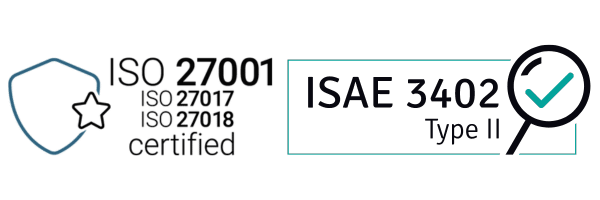
Digitisation in Switzerland
Many Swiss companies are in the middle of the digital transformation. An important component in this is the legally secure electronic signature, which is finding increasing support and users in the business environment. But what do companies in Switzerland have to consider? Which documents can be signed electronically in Switzerland and what types of signatures are there?
The following article summarises the most important principles for legally secure use of the e-signatures in Switzerland.
The following article summarises the most important principles for legally secure use of the e-signatures in Switzerland.
What is the legal basis for a legally secure electronic signature?
Until a few years ago, it was common practice to sign a purchase contract, a new job contract or an agreement on paper. With the ever-increasing spread and use of electronic options, legal frameworks have been created to enable clarity and legal certainty.
In Switzerland, the ZertES (Federal Act on Electronic Signatures in Switzerland) has formed the legal basis for the use of electronic signatures since 2017.
The ZertES includes, among other things:
- how certification services can be recognised.
- the rights and obligations of recognised certification services.
- the technical setup to ensure a high level of safety.
- terminology around electronic signatures and their meaning, including the different types of electronic signatures.
- how the law supports the recognition of electronic signatures in international agreements.
Since 2016, the legal framework for electronic signatures in the European Union has been governed by the eIDAS Regulation . This forms the basis for the ZertES introduced in Switzerland.
In a direct comparison, there are many similarities between ZertES and eIDAS. Both aim to consolidate and promote the acceptance of electronic signatures by means of regulation in their respective spheres of influence, Switzerland and the EU.
Free white paper “General conditions in Switzerland”
Besides the similarities, however, there are also a number of differences. Download our free white paper and learn more about the different interpretations in both regulations. (in German)
Overview of signature types according to ZertES
When is an electronic signature equivalent to a handwritten signature on paper? And which document needs which signature type?
Four types of signature are recognised in the federal law ZertES.
Electronic signature
- Simple, but barely provable
- Can be any form of electronic message that can be attributed to a natural person, such as a scanned signature
- Not relevant for most business processes
- Use: Informal documents
Advanced electronic signature
- Provable signature
- Most used type of legally binding signature
- Usable for most contract types
- Use: Contracts without a formal requirement
Regulated electronic signature
- Only available in Switzerland
- Too inconvenient for most business processes
- Additional hardware is required
Qualified electronic signature
«The qualified electronic signature linked with a qualified time stamp pursuant to the Federal Act of 18 March 2016 on Electronic Signatures is equivalent to the handwritten signature.»
Code of Obligations (CO) Art. 14 para. 2 to
- Provable signature with the highest security level
- Equal to a handwritten signature on paper
- Required certificate is created via certification services
- Use: Contracts with statutory formal requirements
Elektronische Signatur
- Einfach, aber kaum beweisbar
- Kann jede Form einer elektronischen Nachricht sein, die einer natürlichen Person zuzuordnen ist, wie eine eingescannte Unterschrift
- Für die meisten Geschäftsprozesse nicht relevant
- Anwendung: Informelle Dokumente
Fortgeschrittene elektronische Signatur
- Beweisbare Unterschrift
- Meistgenutzte Art der rechtssicheren Unterschrift
- Nutzbar für die meisten Vertragsarten
- Anwendung: Verträge ohne Formvorschrift
Geregelte elektronische Signatur
- Gibt es nur in der Schweiz
- Für die meisten Geschäftsprozesse zu umständlich
- Zusätzliche Hardware wird benötigt
Qualifizierte elektronische Signatur
«Der eigenhändigen Unterschrift gleichgestellt ist die mit einem qualifizierten Zeitstempel verbundene qualifizierte elektronische Signatur gemäss Bundesgesetz vom 18. März 2016 über die elektronische Signatur.»
Obligationenrecht (OR) Art. 14 Abs. 2 bis
In Zusammenarbeit mit einem anerkannten Anbieter können Unterschriftsprozesse rechtsverbindlich und mit deutlich geringerem Aufwand abgewickelt werden. Lediglich Verträge, die notariell beurkundet werden müssen, bilden hierbei eine Ausnahme.
Für alle anderen Fällen gibt es die passende eSignatur mit dem jeweils benötigten Grad an Beweisbarkeit.
Obligationenrecht (OR) Art. 14 Abs. 2 bis
- Beweisbare Unterschrift mit der höchsten Sicherheitsstufe
- Gleichgestellt mit der eigenhändigen Unterschrift auf Papier
- Erforderliches Zertifikat wird über Zertifizierungsdienste erstellt
- Anwendung: Verträge mit gesetzlichen Formvorschriften
In Zusammenarbeit mit einem anerkannten Anbieter können Unterschriftsprozesse rechtsverbindlich und mit deutlich geringerem Aufwand abgewickelt werden. Lediglich Verträge, die notariell beurkundet werden müssen, bilden hierbei eine Ausnahme.
Für alle anderen Fällen gibt es die passende eSignatur mit dem jeweils benötigten Grad an Beweisbarkeit.
In principle, the e-signature makes work processes in companies easier.
In cooperation with a recognised provider, signature processes can be handled in a legally binding manner and with significantly less effort. The only exception are contracts that require notarisation.
For all other cases, there is a suitable e-signature with the required degree of verifiability.
For all other cases, there is a suitable e-signature with the required degree of verifiability.
Swisscom Trust Services and inSign
For contracts requiring a written form, the law requires an electronic signature in accordance with QES. A qualified certificate is required for a legally valid QES, which is equivalent to the handwritten form of signature.
This certificate is offered by inSign via Swisscom Trust Services. Swisscom Trust Services belongs to the list of all recognised certification services in Switzerland.
Cross-border contracts with QES
For cross-border contracts between the EU and Switzerland, it may be necessary for all contracting parties to sign both with a certificate according to ZertES and a second time with a certificate according to eIDAS . With inSign, this is possible without any problems, as qualified signatures according to ZertES and eIDAS can be used simultaneously in one document.Contact/consultation
inSign offers legally secure electronic signatures for Switzerland and the entire EU area. Would you like to use electronic signatures in your company in a legally secure way and not only save money, but also massively accelerate your signature processes at the same time? Then get in touch with our inSign team now.
About the author
Ursula Korotwitschka – Marketing Specialist
Ursula has been working for many years on all aspects of electronic signatures and how smart software can make everyday work easier.
- Further articles
More on the topic of digital signatures



